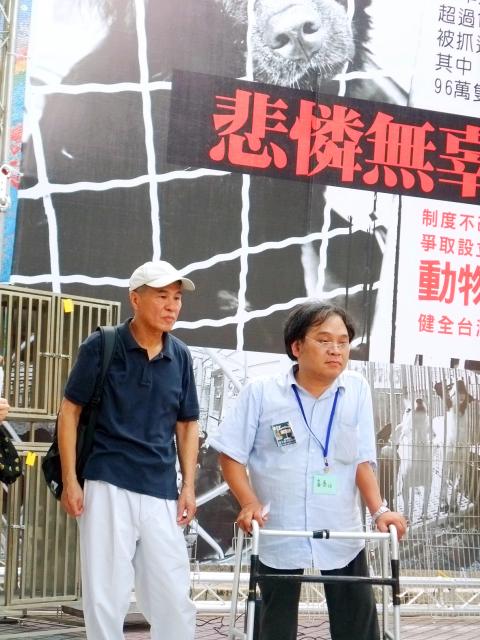Film director Hou Hsiao-hsien (侯孝賢) and writer Chu Tien-hsin (朱天心), along with several other animal rights advocates, yesterday launched a campaign to collect 100,000 signatures for a petition calling on the government to create a separate department for animal protection under the planned ministry of agriculture.
“The ministry of agriculture will be officially created next year, and there must be a separate department for animal protection under the ministry,” Chu said. “If animal protection and animal husbandry are put under the same department, it would show that the government is careless and insincere about protecting animals.”
“After all, the objectives are different — one is for slaughtering of animals, and the other is for protection of animals,” Chu added.

Photo: Chung Li-hua, Taipei Times
Chinese Nationalist Party (KMT) Legislator Ting Shou-chung (丁守中), who showed up to voice his support for the cause, said that asking a department for animal husbandry to handle animal protection “is like asking the Taiwan Tobacco and Liquor Co to take charge of a campaign to discourage smoking.”
The Animal Protection Section under the Council of Agriculture’s Department of Animal Industry is currently the highest body in charge of animal protection, with only seven to eight regular staff.
According to the Executive Yuan’s plan, the agency in charge of animal protection will remain under the Department of Animal Industry when the council is upgraded to the ministry of agriculture next year.
Animal rights advocate Huang Tai-shan (黃泰山) said that although the Animal Protection Act (動物保護法) has been in place for 12 years, the handling of stray animals has not progressed much.
“In the past 12 years, 1.14 million stray dogs — not counting cats — have been caught and sent to animal shelters, and about 960,000 of them never made it out despite calls from governmental and non-governmental organizations for adoption,” he said. “One of the reasons is the lack of professionals to take charge of government handling of stray animals.”
He said that local cleaning squads who have never been trained in catching animals are usually charged with catching strays. The terrible conditions at animal shelters have also led to a high death rate at these shelters, he said.
Chu, who serves with Hou as co-initiators of the campaign, said the petition aims to show the government public support for the creation of a separate department for animal protection under the future agriculture ministry.
“I know that the budget, the manpower and the resources may be limited once a separate department for animal protection is created; however, the creation of such a department is itself a declaration — a declaration that shows the country’s determination to enhance animal welfare and protection,” Hou said. “There may still be a long way to go, but the creation of a separate department for animal protection is a start.”
Lola Huang (黃芷嫻), a specialist at the Life Conservation Association, said that having a stronger central government-level animal protection department could help draft “a unified plan for animal protection in the country and allocate resources to local branches.”

Hong Kong-based American singer-songwriter Khalil Fong (方大同) has passed away at the age of 41, Fong’s record label confirmed yesterday. “With unwavering optimism in the face of a relentless illness for five years, Khalil Fong gently and gracefully bid farewell to this world on the morning of February 21, 2025, stepping into the next realm of existence to carry forward his purpose and dreams,” Fu Music wrote on the company’s official Facebook page. “The music and graphic novels he gifted to the world remain an eternal testament to his luminous spirit, a timeless treasure for generations to come,” it said. Although Fong’s

China’s military buildup in the southern portion of the first island chain poses a serious threat to Taiwan’s liquefied natural gas (LNG) supply, a defense analyst warned. Writing in a bulletin on the National Defense and Security Research’s Web site on Thursday, Huang Tsung-ting (黃宗鼎) said that China might choke off Taiwan’s energy supply without it. Beginning last year, China entrenched its position in the southern region of the first island chain, often with Russia’s active support, he said. In May of the same year, a Chinese People’s Liberation Army Navy (PLAN) force consisting of a Type 054A destroyer, Type 055 destroyer,

Actor Darren Wang (王大陸) was questioned by prosecutors for allegedly orchestrating an attack on a taxi driver after he was allegedly driven on a longer than necessary route in a car he disliked. The questioning at the New Taipei City District Prosecutors’ Office was ongoing as of press time last night. Police have recommended charges of attempted murder. The legally embattled actor — known for his role in the coming-of-age film Our Times (我的少女時代) — is under a separate investigation for allegedly using fake medical documents to evade mandatory military service. According to local media reports, police said Wang earlier last year ordered a

Taiwan is planning to expand the use of artificial intelligence (AI)-based X-ray imaging to customs clearance points over the next four years to curb the smuggling of contraband, a Customs Administration official said. The official on condition of anonymity said the plan would cover meat products, e-cigarettes and heated tobacco products, large bundles of banknotes and certain agricultural produce. Taiwan began using AI image recognition systems in July 2021. This year, generative AI — a subset of AI which uses generative models to produce data — would be used to train AI models to produce realistic X-ray images of contraband, the official